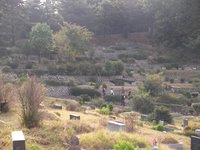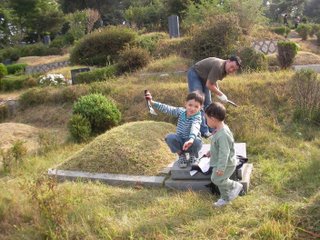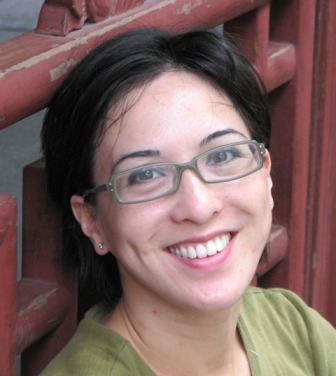 Chusok. Chusok is most commonly referred to as the “Korean Thanksgiving” and, like Thanksgiving, involved overeating, waaaay too much time with extended family, and travel. Everyone’s emotions were particularly sharp and sensitive and all simmering resentments and unmet expectations somehow emerged in stupid generational arguments over what is OK to say to a 2-year old. Nevermind.
Chusok. Chusok is most commonly referred to as the “Korean Thanksgiving” and, like Thanksgiving, involved overeating, waaaay too much time with extended family, and travel. Everyone’s emotions were particularly sharp and sensitive and all simmering resentments and unmet expectations somehow emerged in stupid generational arguments over what is OK to say to a 2-year old. Nevermind.But unlike Thanksgiving, a significant part of Chusok involves remembrance of the dead. And I’m not talking about Pilgrims and Indians. During Chusok many families perform rites of ancestor worship, which I can’t really speak about because my in-laws are Christian and don’t do them, so I haven’t been able to witness this particular aspect of Chusok. All I know is the other mom friends who do these rituals don't enjoy them; they involve a lot of cooking and preparation and close contact with critical mother-in-laws.
The part that I do know about is visiting the graves. Koreans traditionally are buried on mountainsides, in graveplots like this one. Family members are supposed to care for the graves, trimming the grass and keeping them clean and looking nice. On holidays like Chusok, families go and spend a day at the gravesite, trimming and weeding and eating and drinking and talking and singing rather loudly (good thing we don't do the singing, we wouldn't want to upset the dead). If you live close enough to your ancestor’s grave, and can figure out how to avoid traffic on the holidays, it is a nice tradition. I like the idea of gathering at the grave and having something productive to do rather than just standing around awkwardly and putting flowers down. But for many people, the ancestor’s graves are a source of guilt, annoyance, and frustration. These days, between the declining birth rate, increased immigration to other countries, and worsening traffic at holiday times, deciding who will take care of these graves is a big problem. And, with so few holidays, many Koreans (like us) are choosing to travel abroad over Chusok rather than perform their familial duties.
This aspect of Chusok -- the part about remembering the dead -- was particularly poignant since it was on Chusok that I found out that my grandmother had passed away. The funeral was scheduled for less than 36 hours after I had found out (we had actually been in Malaysia, feasting while many were fasting for Ramadan, so I was out of contact for a day or so) and it was not humanly possible for us to make it back to the U.S. for the funeral without a private jet. So I am here, in Korea, remembering my grandmother and experiencing the funeral through cellphone calls from my brother and mother in Denver.
My grandmother is my last grandparent to pass. She was 93 and died in her sleep after steadily declining for several years. She had a good, long life, so I am not overcome with a sense of loss; and yet it disturbs me that she has passed and I’m not sure how I will remember her. I mean that her grave is in Denver, a place I rarely go. Even though she lived in the U.S. for 50 years, the most significant parts of her life are a mystery to me, since I only saw my grandparents once or twice a year while I was growing up; plus her English was not strong and my Chinese was minimal at best. I know some of the stories about her in the War: she gave birth to my mom on an ammunitions train while escaping from the Japanese. But she and my grandfather didn’t like to talk about these memories much so they have mostly faded into the past. Now I will never hear her talk of them again.
I think my grandmother's death bothers me most because it is the end of an era. Now my parents are the oldest generation. I see them age each year, see their hands wrinkle and their reflexes slow. My grandmother had been the reason I visited that side of the family; now, for various reasons, I don't think I will them very often at all.
I am glad my kids are spending so much time with their grandparents these days (although right now I think I will go INSANE if I have to see any more of my in-laws this week. Deep breath. Serenity now!); I'm glad they can speak the same languages and go on trips together. My father-in-law has already expressed concern that being buried will cause us too much hassle, especially since we plan on leaving Korea sometime in the next few years. He wants to be cremated. He, like my grandparents, survived horrors during the Korean War of which he doesn't like to speak. A gravesite or a war memorial give one a place to focus one's memory; a day like Chusok gives one a time set aside to remember.
What will my children remember of their grandparents? Where will they go to remember them? And when will they remember?
For once, a short post.





No comments:
Post a Comment